A Holistic Beauty Guru Explains When Natural Skin Care Ingredients Aren't Enough

In a consumer culture that eschews sulfates in shampoo and parabens in soap, many of us still don’t understand why we’re rejecting them. We’ve created a high demand for “clean” and “natural” beauty products, but there are few, if any, regulations defining what those terms actually mean. In such a lawless land of labeling, we’re forced to trust that our favorite brands will advertise their wares in a way we can understand, but unfortunately the marketing claims aren’t always accurate.
That’s why we’ve decided to speak with founders of natural beauty companies on a one-on-one basis, to better to understand the terms they use on their labels, their ideals and their philosophies. We’re starting with a brand that’s been on our radar for more than a decade, Naturopathica.
Easily identified by its signature marine-blue glass bottles, Naturopathica has been around since 1995. The brand was founded by Barbara Close, an herbalist, esthetician and aromatherapist who believes in taking a holistic approach to treating the source of imbalances, rather than trying to fix symptoms after they’ve sprouted.
We had the chance to ask Close about her product development philosophy, how she defines her brand’s principles, and when the all-natural route isn’t the best option. Check out the conversation below.
When it comes to beauty products, is natural always better than synthetic?
As a brand founded on naturopathic principles, we believe in the healing capacity of plants. But we recognize there are times when chemistry can enhance what nature has to offer. My background introduced me to the nourishing power of herbs, which serve as the base of all of our formulas, but it was my experience as an esthetician that really opened my eyes to the leading cause of skin imbalances: irritants in our skin care and environment.
In response, our approach isn’t based on avoiding all synthetic ingredients ― it’s based on avoiding the allergens and irritants in skin care that do more harm than good. Irritating synthetics are usually recognized as the primary, active ingredients in skin care and cosmetics, but brands often ignore that they’re hidden in the base materials and delivery systems. When we choose clean actives, they are safe, effective and kind to Mother Earth.
You’re a trained herbalist. What exactly does that mean, and what kind of training is involved?
I’ve been studying and practicing herbal medicine for more than 30 years, which means that I’m passionate about understanding the practical uses of herbs for healing everyday imbalances. I first apprenticed as an herbalist in Santa Fe and eventually traveled throughout the U.K. and Europe to learn from experts in aromatherapy and herbal medicine. Europe has a lot of ancestral knowledge of herbalism and it’s a trade that’s passed down through practice. Years later, I went back to school to earn my master’s in therapeutic herbalist from the Maryland University of Integrative Health.
As a practicing herbalist, I use my garden and local markets ― from Chinatown to farm stands in the Hamptons ― to develop teas, tinctures, skincare and salves to remedy everything from scrapes and sore muscles to seasonal allergies.
What kind of degree is required to work as one of the people who formulate your products?
Depending on the product we’re looking to create, I work with a number of different types of experts to perfect our formulas. They may include green chemists or herbal specialists that can help me to dive deeper into ingredient innovation, or sourcing and optimizing our botanical extracts.
What labels do you prefer: All-natural? Clean?
Holistic. We look at the root cause of skin imbalances, not just the symptoms, and use our skin care, herbal remedies and treatments to heal the body, resulting in beautiful and heather-looking skin both immediately and over time.
And are there certain terms you avoid on your labels?
I do tend to be wary of greenwashing language and fear-based claims that are so off-putting. Skin care should always feel inviting and accessible, not overwhelming.
Just how natural are your products? Are there regulations or certifications that you abide by?
Although we choose to use select safe synthetics in our formulas, we believe in transparency and partner with Ecocert natural and organic cosmetic certification for 16 of our skin and body remedies. Ecocert-certified products must contain 95-99% ingredients from natural and or organic origin and require fair trade, sustainable business practices from sourcing to packaging. Although we don’t certify our full range, the same sourcing and ingredient standards are applied to all of our formulas.
I was surprised to learn Vitamin C is synthesized. What other ingredients in skin care would the average person be surprised to find out aren’t straight from nature, and how do we know which synthetic ingredients are OK to use?
In the select cases that we use synthetics, like Vitamin C, they are well-researched and thoughtfully chosen for their extraordinary results and sustainability. The ascorbic acid that powers our Vitamin C, for example, is molecularly identical to what grows on trees, but is gentler, more potent and better for the environment ― preventing the use of pesticides and water waste.
AHAs, like glycolic acid and lactic acid, can actually be extracted from natural resources, like sugar cane, and are made through fermentation. Safe synthetics that may surprise you are other vitamins ― Vitamin A, Vitamin K and Vitamin E, to name a few ― all of which have to be synthesized to be stable. Vitamin A is also known as retinol, one of the most controversially discussed actives in skin care.
What’s your personal philosophy regarding a natural lifestyle?
My motto is Julia Child’s motto: “Everything in moderation, including moderation.” I don’t believe in extremism or the notion that you can be 100% balanced ― the body is excellent at self-regulating and is constantly ebbing and flowing, like nature, to keep us healthy and strong. That being said, I try to eat mostly anti-inflammatory, skin-boosting foods. I do the Whole 30 once or twice a year to hit the “reset” button, and I use herbs on a daily basis to help regulate my stress, immunity and energy ― to help prevent burnout and other common issues that arise from our hectic lifestyles.
We all hear terrible things about chemicals destroying the planet and our bodies, but a lot of us don’t really understand how. From your perspective as an herbalist, how exactly do chemicals harm us and the planet in ways that natural ingredients don’t?
Like natural ingredients, synthetics that are produced in a lab and not extracted from nature are not all are created equally, so it’s a very nuanced conversation. Certain synthetics are unquestionably bad for the skin and environment because they promote inflammation, pollute our waterways and present danger of toxicity. Those are silicones, formaldehydes, artificial fragrance and dyes, unsafe preservatives like parabens and phenoxyethanol, and animal-derived ingredients ― to name a few.
However, it’s also important to be mindful of sourcing natural ingredients, which can present similar environmental threats when not accessed responsibly. With the exciting rise in clean and natural formulation, deforestation and depletion of natural resources ― especially trendy ingredients like argan oil ― is becoming an urgent concern, so we need to be mindful as an industry of how we’re sourcing and using natural resources. Solvent extraction, for example, can leave trace allergens and irritants in our products, so it’s important to always choose cold-pressed essential oils and extracts. We also look to harness technology like plant stem cells that allow us to use the power of potent botanicals without compromising the plant material and contributing to water waste.
Is there anything chemicals and synthetics can achieve that natural skin care can’t?
For more acute skin concerns, like acne, fine lines and hyperpigmentation, certain clean actives are most effective for stimulating a visible change in the skin. The best results are achieved when we combine the best of whole-plant botanical extracts with select, clean actives ― maximizing results without compromising skin health.
Related...
The Best Face Oils And Serums That We've Ever Tried
8 Editors Share The Skin Care Products They Use Religiously
The Tried-And-True Skin Care Gifts Our Editors Can't Live Without
Also on HuffPost
For the best of the best: SkinCeuticals C E Ferulic
![The skincare experts who talked to HuffPost overwhelmingly recommend <strong><a href="https://fave.co/2Wb3q5l" target="_blank" rel="noopener noreferrer">SkinCeuticals C E Ferulic Vitamin C serum</a></strong>, but it doesn't come cheap. "Be aware that Vitamin C serums are a concentrated ingredient, thereby [are] very potent and active," says esthetician Melissa Lekus of <strong><a href="https://melissalekus.com/" target="_blank" rel="noopener noreferrer">Melissa Lekus Skincare Consulting</a></strong>. "So don’t be surprised when your Vitamin C serum is one of the most expensive products in your arsenal." So, what's the difference between a $10 Vitamin C serum and a $100 Vitamin C serum? It's due in part to its formula. "Vitamin C is an unstable molecule on its own, so it works best when combined with Vitamin E or ferulic acid," says dermatologist <a href="https://www.instagram.com/stayskinsafe/" target="_blank" rel="noopener noreferrer"><strong>Tsippora Shainhouse</strong></a> of Rapaport Dermatology. <br><br /><br><a href="https://fave.co/2Wb3q5l" target="_blank" rel="noopener noreferrer"><strong>SkinCeuticals C E Ferulic is available at Dermstore</strong></a> for $166.](https://s.yimg.com/ny/api/res/1.2/ErNKeQRncvOZq3QHJD81Iw--/YXBwaWQ9aGlnaGxhbmRlcjt3PTk2MA--/https://img.huffingtonpost.com/asset/5c37a1c220000053006ba8f8.png?ops=crop_109_36_639_531)
<br> SkinCeuticals C E Ferulic is available at Dermstore for $166.
For first timers: The Ordinary Magnesium Ascorbyl Phosphate 10%
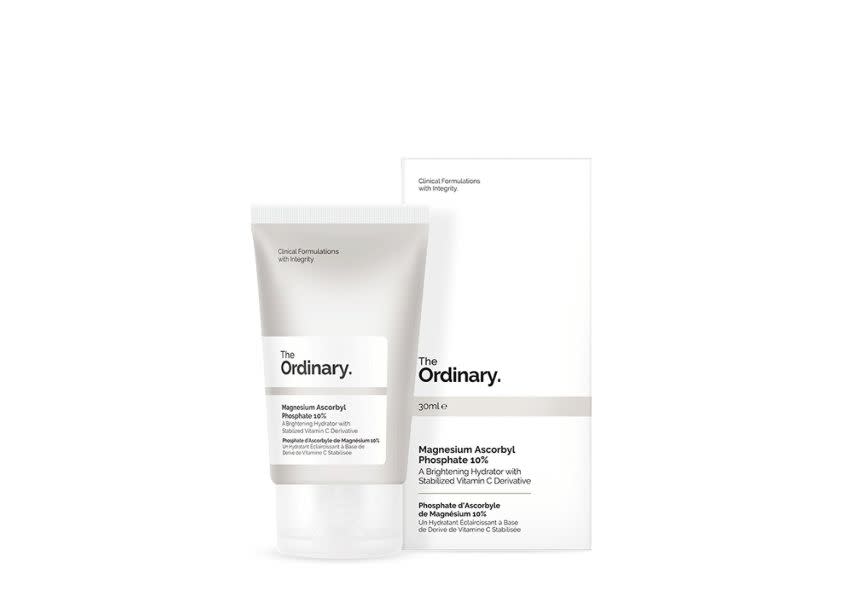
<br>The Ordinary Magnesium Ascorbyl Phosphate 10% is available at Beauty Expert for $10.50, or SkinStore for $9.60.
For a stable formula: Peter Thomas Roth Potent-C Power Serum
![Dermatologist Erum Ilyas of <strong><a href="http://montgomery-dermatology.com/" target="_blank" rel="noopener noreferrer">Montgomery Dermatology</a></strong> says that the key to buying a good Vitamin C formula is to educate yourself on its ingredients. "If you are going to look for a Vitamin C-containing product, make sure the concentration and type of Vitamin C is listed. L-ascorbic acid or tetrahexyldecyl (THD) ascorbate are the most active types." She also recommends searching for serums with between 10- to 20-percent concentration, like <strong><a href="https://fave.co/2AXELIB" target="_blank" rel="noopener noreferrer">Peter Thomas Roth Potent-C Power Serum</a></strong>. "If [that's] not the case, Vitamin C can be very unstable on exposure to light, and essentially be useless. That’s money wasted.”<br><br /><br><strong><a href="https://fave.co/2AXELIB" target="_blank" rel="noopener noreferrer">Peter Thomas Roth Potent-C Power Serum is available at Sephora</a></strong> for $95.](https://s.yimg.com/ny/api/res/1.2/UzXOf5.5dFl7MbsknXcTxw--/YXBwaWQ9aGlnaGxhbmRlcjt3PTk2MA--/https://img.huffingtonpost.com/asset/5c37abd224000033009f8cd8.png)
<br>Peter Thomas Roth Potent-C Power Serum is available at Sephora for $95.
For daily use: Mad Hippie Vitamin C Serum
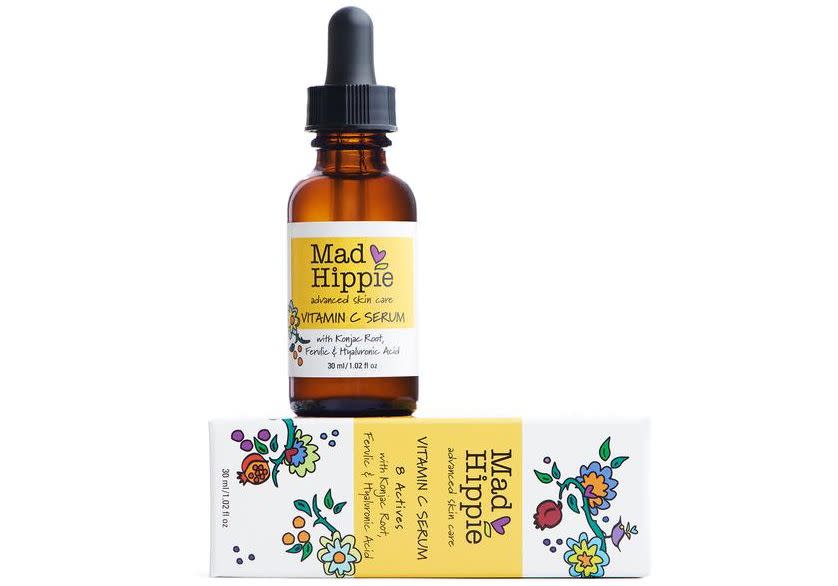
<br>Mad Hippie Vitamin C Serum is available at Ulta for $34.
For all-natural ingredients: 100% PURE Vitamin C Serum
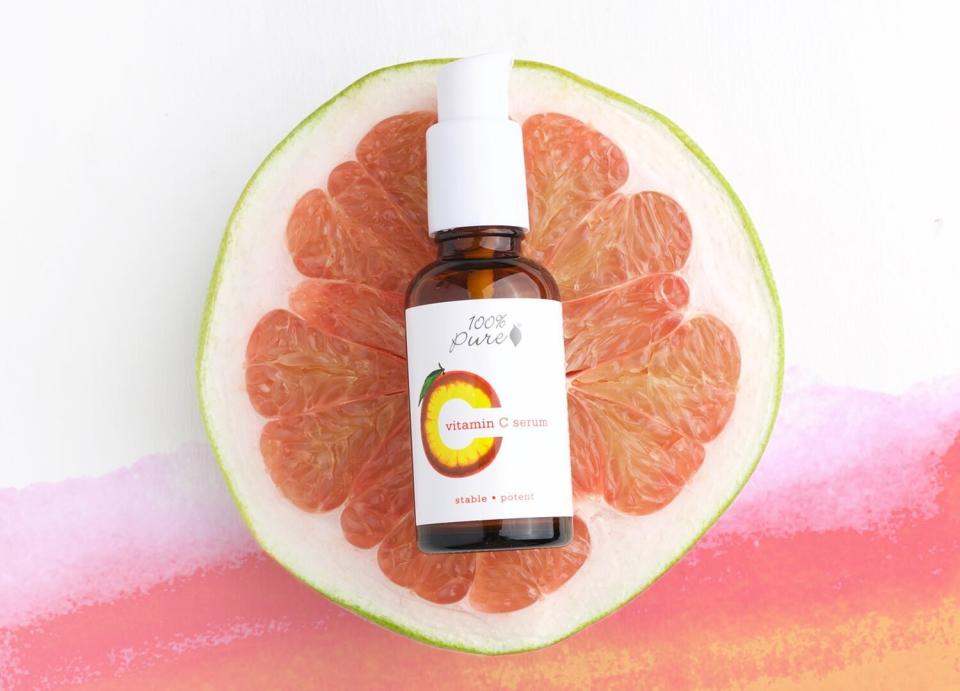
<br> 100% Pure Vitamin C Serum is available at 100% Pure for $41.
For dull skin: Dr. Dennis Gross C+ Collagen Brighten & Firm Vitamin C Serum
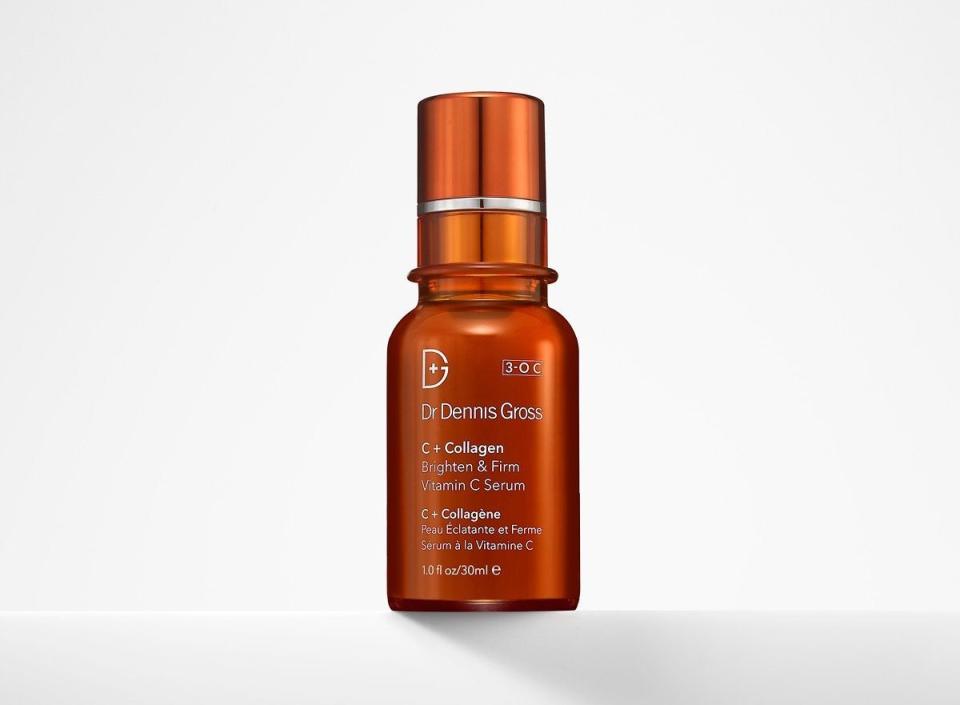
<br>Dr. Dennis Gross C+ Collagen Brighten & Firm Vitamin C Serum is available at Sephora for $78.
For age spots: Citrix Vitamin C Pro-Collagen Brightening Serum
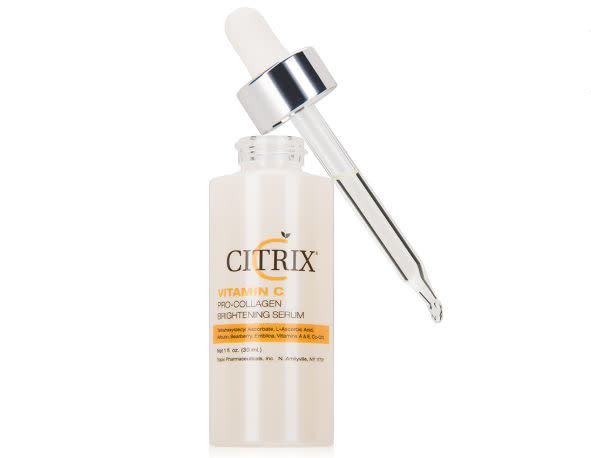
<br>Citrix Vitamin C Pro-Collagen Brightening Serum is available at Dermstore for $114, or Walmart for $77.
For acne scars: Sweet Chef Ginger + Vitamin C Serum Shot
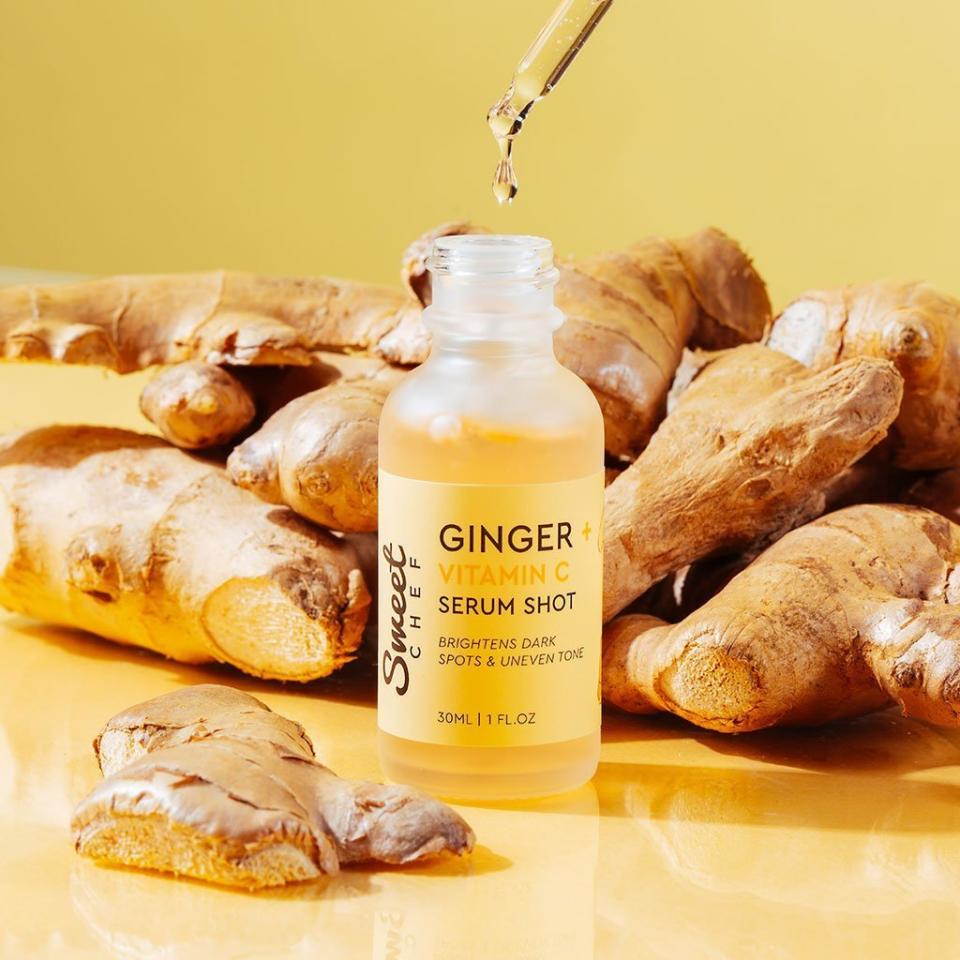
<br>Sweet Chef Ginger + Vitamin C Serum Shot is available at Glow Recipe for $20, or Target starting Jan. 27.
For affordability: Oz Naturals Vitamin C Facial Serum
![Dermatologist <a href="https://www.instagram.com/stayskinsafe/" target="_blank" rel="noopener noreferrer"><strong>Tsippora Shainhouse</strong></a> of Rapaport Dermatology recommends <a href="https://fave.co/2WincMq" target="_blank" rel="noopener noreferrer"><strong>Oz Naturals Vitamin C Facial Serum</strong></a> for those who want a wallet-friendly serum. "[It's] a much less expensive, vegan-friendly Vitamin C serum with AHA (natural glycolic acid)," she says. "Consumers love the texture and notice brighter skin with reduction in hyperpigmentation over time." She advises wearing it in the morning under sunscreen for protection from free radicals, as well as as nighttime to undo oxidative damage from the day.<br><br /><br><strong><a href="https://fave.co/2WincMq" target="_blank" rel="noopener noreferrer">Oz Naturals Vitamin C Facial Serum is available at Oz Naturals</a></strong> for $18.](https://s.yimg.com/ny/api/res/1.2/ItZdf9qHPZMg3mY6HS7.Fg--/YXBwaWQ9aGlnaGxhbmRlcjt3PTk2MA--/https://img.huffingtonpost.com/asset/5c4b3dd820000001016bbd7b.png)
<br>Oz Naturals Vitamin C Facial Serum is available at Oz Naturals for $18.
Love HuffPost? Become a founding member of HuffPost Plus today.
This article originally appeared on HuffPost.

